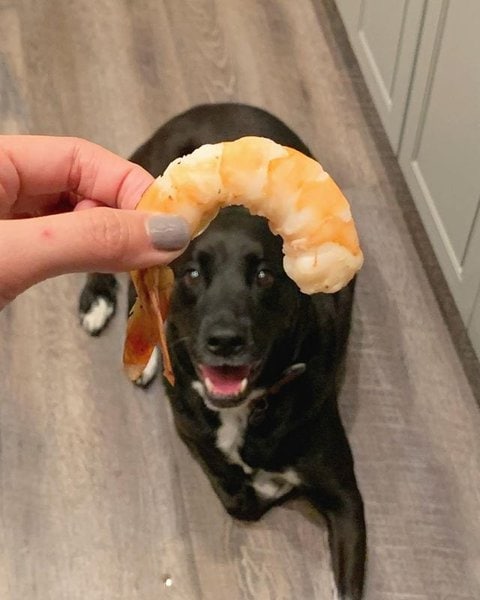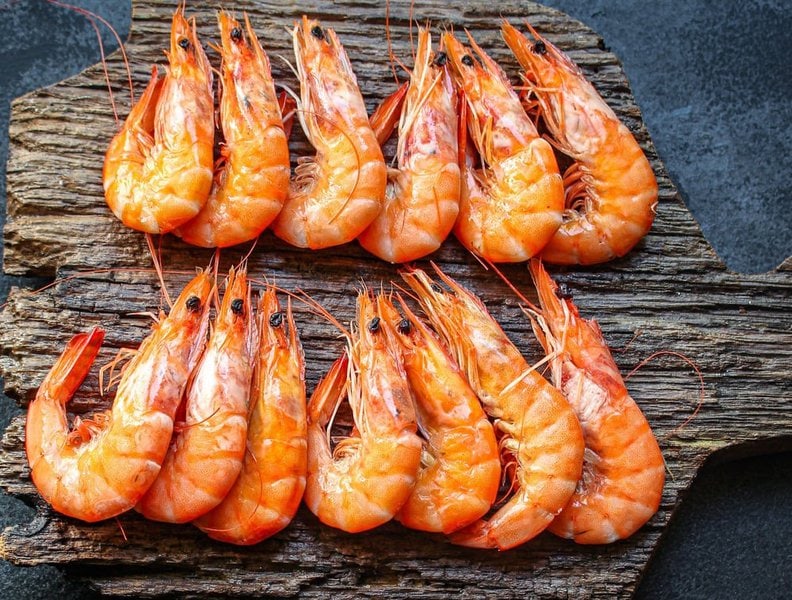Bet you’re in doubt if it’s a good idea to share some crustaceans, shrimps specifically with your fur baby. Perhaps you worry about seafood allergies and poisoning.
You’re not alone because these are the common reasons why a lot of fur parents refrain from feeding their dogs shrimps. But are shrimps really that bad for your dog?
Shrimps are not that bad for dogs for as long as these crustaceans are fed with caution. Shrimps are a great source of protein, vitamins, and minerals. But be mindful of the shells and the tails because these parts can be choking hazards to dogs, more so for puppies.
To learn more about the nutritional values of shrimps, we’d be delving into the various reasons why shrimps can be incorporated into your dog’s diet. How many shrimps are safe for your dog, and what about seafood allergies? Are raw shrimps OK? Let’s learn now.
Is Shrimp Good For Dogs?

Yes, you can save a few pieces of cooked shrimps for your pooch. Shrimps are not only nourishing foods, but they are low in calories.
We’ve listed below the reasons why shrimps are okay for dogs to consume:
Shrimp Contains Glucosamine
Glucosamine is a substance that is naturally produced by your dog’s body. Its main function is for the repair and maintenance of cartilage for pain-free mobility.
You can look at cartilage as a ‘marshmallow’ in-between bones, acting as a shock absorber, cushioning the bones of your dog during walking or running.
However, as your dog advances in age, the ability of its body to produce glucosamine decreases. As a result, the joints stiffen up, challenging mobility.
In this case, adding glucosamine to its daily diet helps. And one place to find this is from those delicious bounties of the sea like shrimps.
Shrimp Contains Antioxidants
Do you know why shrimps turn into a nice pink color when they are cooked? It’s because of a compound named astaxanthin, a powerful antioxidant classified under the group of carotenoids.
Astaxanthin is a red pigment that occurs in some algae that turn those who eat it color pink, like salmon. In the case of shrimps, heat exposure releases the astaxanthin inside its system; that’s why it turns pink.
Antioxidants such as astaxanthin give your dog protection from free radicals. These free radicals are the bad guys that damage the cells and DNA of your dog. Once these are damaged, your dog is prone to cancer, premature aging, and chronic diseases.
There’s more because astaxanthin is a good protector of the cells, helps prevent canine cataracts, and eases dry eyes.
Shrimp Contains Taurine
Taurine is an amino acid that is present in meat as well as in shrimps. Same as glucosamine, taurine is also naturally manufactured by your dog. The larger dog breeds produce less taurine than the small ones.
Adding taurine to your dog’s diet decreases its vulnerability to blindness and dilated cardiomyopathy.
Shrimps are good sources of taurine because an ounce of shrimps contains 48 mg of taurine.
Shrimp Contains Vitamins And Minerals
As mentioned earlier, shrimp is healthy food for your pooch.
Shrimps have high levels of omega-3 fatty acids that aid in keeping your dog looking fab. It’s because omega-3 fatty acids work wonders by maintaining a shiny coat, healthy skin, and reducing inflammation.
On top of that, vitamin D, vitamin B3, and vitamin B12 can be found in shrimps. The same goes for essential minerals like selenium, phosphorus, choline, copper, and iodine. Did we also say that shrimps are low in calories?
On average, for every 3 oz of shrimp, it only contains 0.7 oz of protein. This is an awesome way to boost up the protein level of your dog in a safe and healthy way.
How Much Shrimp Can Dogs Eat?

Moderation is the word to remember every time you are giving human food to your dog, and that includes shrimp.
For smaller dog breeds, you can let it enjoy one-half piece to 1 whole piece of shrimp each week. For medium-sized dogs, 1 to 2 pieces of shrimp are good enough for them to reap the nutrition benefits of shrimps. Larger dogs can have 2 to 4 pieces of shrimp.
In case you want to incorporate shrimps into your dog’s daily diet, it’s best to get professional advice.
Does Shrimp Make Dogs Sick?
Yes, because the shells and the tails are not safe as these can cause choking. If the shrimps are not fresh and uncooked, they can also be contaminated with bacteria.
Plus, some dogs can have allergic reactions to shrimps.
These are the reasons why we want you to test if your pooch will react negatively to this type of crustacean.
Start slow, and if there are no adverse reactions, then shrimps can be given as an occasional treat unless the vet says it’s perfectly alright to give shrimps daily.
Choking Hazard
The crunchy sound of the shrimp tails, shells, and even the head can turn those tails wagging with excitement. But, do not even attempt to give these to your furry pet.
The sharp edges of the shell and the tail can cause irritation to your dog’s upper gastrointestinal tract and can result in choking.
But here’s a kitchen secret we’d like to share with you. There’s a safe way for your dog to enjoy these ‘forbidden’ parts of the shrimp.
In a pan, boil together water, shells, tails, and head for about 30 minutes. Then add some fresh produce, like celery and carrots, and allow to boil for a few more minutes. Afterward, strain the liquid and let the broth cool.
Now, your pooch can have a taste of this delightful and flavorful shrimp broth to reap the nutritional benefits from shrimp shells, tails, and head.

Bacterial Contamination
All types of shellfish, if eaten undercooked or raw, can possibly cause infectious diseases both to man and his best friend.
Raw shrimps are carriers of pathogens that can turn your dog’s tummy topsy-turvy, causing diarrhea and vomiting. Blame it on salmonella and listeria bacteria.
Shrimp Allergies
Just like humans, some dogs cannot tolerate shrimps. As a result, they tend to suffer from allergies. As mentioned earlier, always introduce a new food with a minimum amount and then observe if there’d be any adverse reactions like:
- Hives
- Facial swelling
- Itchy skin
- Vomiting and diarrhea
- Flatulence
In extreme cases, some dogs can be very allergic to shrimps and may suffer from allergic shock, also referred to as anaphylaxis. This can happen very fast, and two of the common symptoms are difficulty breathing and excessive drooling.
If you notice any of these signs, it’s best to take your dog to the vet right away.
Which Dogs Should Not Eat Shrimps?
Refrain feeding shrimps to dogs that are diagnosed with kidney disease because their systems may not tolerate the high levels of phosphorus.
How Do I Feed My Dog Shrimp?
To begin, start by buying fresh shrimps, and choose the ones without any fishy odor. Before cooking the shrimp, remove all choking parts – the shells, tails, and head.
It’s up to you if you prefer to either boil or steam the shrimps. Another option is to grill the shrimps. Regardless of how you cook the shrimps, bear in mind not to add any seasonings and to cook the shrimps very well.
Can Puppies Eat Cooked Shrimps?
If cut into bite-sized pieces, yes, cooked shrimps can be given as reward treats for puppies, especially during obedience training sessions. But, as always, practice caution all the time.
Puppies still have sensitive guts, so feeding shrimps should be done in moderation.
Can Dogs Eat Fried And Battered Shrimps?
This is not a good idea because greasy food can cause upset stomachs in dogs. It’s even worse if you will coat the shrimps with a batter that is laden with seasonings and flour.
Remember that some seasonings like garlic and onion powder can be toxic to your fur baby if eaten in huge amounts.






